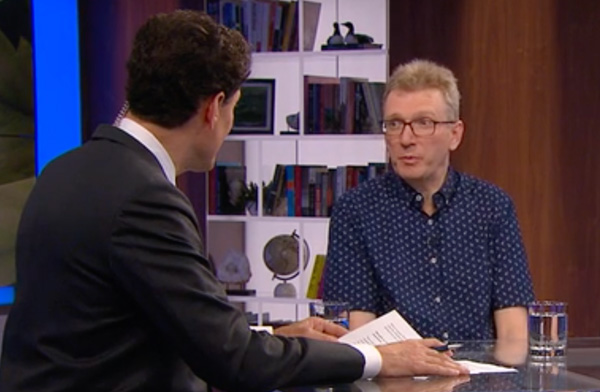
Prof Marcel Martel (at right) with Steve Paikin on The Agenda on TVO
In light of the passage of the federal government’s historic bill on recreational cannabis use, TVO The Agenda’s Steve Paikin interviewed history Professor Marcel Martel about the massive shift in public perception throughout history surrounding the soon-to-be legal drug.
This segment of The Agenda entitled Pot Prohibition: A Long, Strange Trip, had three guests, including Martel, to discuss how society has moved from persecuting the use of marijuana to legalizing it. Martel began by explaining Canada’s role in mobilizing the international community, launching the war on drugs and putting cannabis on the list of drugs that should be illegal.
“Mackenzie King, the famous prime minister, before he became prime minister, was sent to an international conference in Shanghai, in 1907-08,” said Martel. “Mackenzie King, with other Americans, really pushed the agenda of putting, first opium, but also other drugs on the list of substances that the world community should ban. Canada has played a role in enrolling the rest of the world in this war on drugs.”
Martel recounted that when marijuana became illegal many people were portraying use of the drug as a terrible choice. He said that many religious leaders and members of the Christian community believed that marijuana “would destroy you as a human being and above all that it would destroy your soul.”
When asked about why cannabis was not legalized in 1973, when the Royal Commission recommended the decriminalization of marijuana in Canada, Martel attributed it to a lack of political will.
“Since the 1960s, we’ve been talking about drugs, we’ve been talking about marijuana. It was a very divisive debate: the RCMP, concerned parents, religious leaders, social activists, hippies etc.,” he said. “The Liberals who were in power had many other issues to deal with and they decided not to push that one further. They had already dealt with abortion’s partial decriminalization, (and) they dealt with bilingualism. It (marijuana) was already very controversial… and the prime minister’s office felt that maybe we should be careful or maybe public opinion was not ready to move ahead with decriminalization.”
Martel also discussed the medical community’s divisiveness over the short-term and long-term impacts of marijuana on the developing brain. Back in the 1960s, it was okay to drive under the influence and yet today we can all agree on the negative impacts of said behavior, he said, Yet, there is still a debate on whether or how much marijuana affects the brain.
As parting words, Martel spoke about the possibility of danger when it comes to treating marijuana as a benign substance.
“I don’t think it will happen overnight. I think the next 12 months, there will be individuals who will express their concerns. But, I suspect that over time, what has happened with alcohol, will happen with marijuana,” he said. “We should welcome the fact that now it would be possible to study the impact, not only the short-term impact, but also the long-term impact. It will probably trigger a larger discussion about drug use in general, including those substances that are still illegal. What are we doing with those who have developed dependence?”
